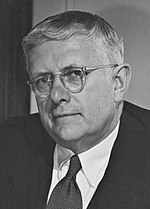H. V. Evatt, Date of Birth, Place of Birth, Date of Death
TweetH. V. Evatt
Australian judge and politicianAbout H. V. Evatt
- Herbert Vere Evatt, (30 April 1894 – 2 November 1965) was an Australian politician and judge.
- He served as leader of the Australian Labor Party (ALP) and Leader of the Opposition from 1951 to 1960, Attorney-General and Minister for External Affairs from 1941 to 1949, and as a judge of the High Court of Australia from 1930 to 1940. Evatt was born in East Maitland, New South Wales, and grew up on Sydney's North Shore.
- He studied law at the University of Sydney, attaining the degree of Doctor of Laws (LL.D.) in 1924.
- After a period in the New South Wales Legislative Assembly (1925–1930), Evatt was appointed to the High Court in 1930 by the Scullin Government.
- He was 36 years old, and remains the youngest appointee in the court's history.
- He was considered an innovative judge, but left the court to seek election to federal parliament at the 1940 federal election. In 1941, the ALP returned to government under Prime Minister John Curtin.
- Evatt was appointed Attorney-General and Minister for External Affairs, positions he held under Curtin and Ben Chifley until the government's defeat at the 1949 federal election.
- He served as President of the United Nations General Assembly from 1948 to 1949, and helped to draft the Universal Declaration of Human Rights.
- After Chifley's death in 1951, Evatt was elected as his successor as ALP leader.
- Internal tensions over the party's attitude to communism during the Cold War culminated in a party split in 1955.
- The ALP was defeated at three consecutive federal elections under Evatt's leadership, in 1954, 1955 and 1958.
- He faced three leadership spills before being convinced to retire from politics in 1960 and accept the post of Chief Justice of New South Wales.
Read more at Wikipedia
See Also
- Famous People's Birthdays on 30 April, Australia
- Famous People's Birthdays in April, Australia
- Famous judge's Birthdays on 30 April, Australia
- Famous judge's Birthdays in April, Australia
- Famous writer's Birthdays on 30 April, Australia
- Famous writer's Birthdays in April, Australia
- Famous lawyer's Birthdays on 30 April, Australia
- Famous lawyer's Birthdays in April, Australia
- Famous politician's Birthdays on 30 April, Australia
- Famous politician's Birthdays in April, Australia
- Famous diplomat's Birthdays on 30 April, Australia
- Famous diplomat's Birthdays in April, Australia


 Date of Birth:
Date of Birth:  Place of Birth: East Maitland, New South Wales, Australia
Place of Birth: East Maitland, New South Wales, Australia